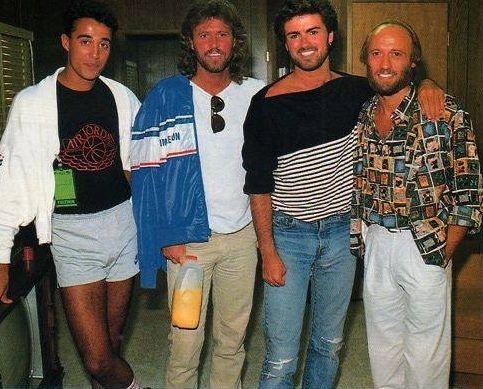
The deaths of two iconic musicians, George Michael and Maurice Gibb, both raised questions surrounding their untimely passings and the personal battles they faced in their lives. These legends left behind rich musical legacies but also struggled with physical and mental health issues that may have contributed to their early deaths.
George Michael’s Sudden Passing
George Michael, known for his timeless hits and incredible vocal talent, tragically passed away on December 25, 2016, at the age of 53. His death shocked the world, and many fans were left questioning what happened to this beloved star. Initial reports cited natural causes, but speculation soon arose, particularly about his underlying health conditions. Forensic pathologist Dr. Michael Hunter conducted an investigation and found that Michael had died of dilated cardiomyopathy, a heart condition, along with myocarditis and fatty liver disease. While these conditions are linked to lifestyle, they can be managed with medication and lifestyle changes. The question that remains is whether Michael was aware of these conditions before his death.
The Role of George Michael’s Lifestyle
Throughout his career, Michael struggled with personal demons, including substance abuse. His battle with drugs, alcohol, and mental health challenges left him in a fragile state by the time of his passing. In 2011, Michael collapsed and was hospitalized for pneumonia, which brought to light his deteriorating health. Despite efforts to turn his life around, the toll of years of self-destructive behavior contributed to his sudden cardiac death. His extensive use of prescription drugs, marijuana, and rumors of cocaine and GHB use painted a picture of someone who had pushed his body beyond its limits. It is likely that these factors, combined with his history of depression, contributed to his untimely death.
Maurice Gibb’s Unexpected Passing
Maurice Gibb, one-third of the Bee Gees, passed away on January 12, 2003, at the age of 53, just days after undergoing emergency surgery for a twisted intestine. While he appeared healthy in the months leading up to his death, a sudden collapse and excruciating abdominal pain pointed to an underlying health issue. The autopsy revealed that Gibb had a rare congenital condition called malrotation of the small intestine, which caused a blockage and led to septic shock. Despite a successful surgery, his weakened body and prior smoking habit likely led to cardiac arrest.
The Complexities of Maurice’s Health
Gibb’s death was compounded by a lifetime of health issues. He was a heavy smoker, and although he had stopped drinking alcohol in his later years, his past drinking and drug use likely contributed to his health problems. The emotional toll of losing his younger brother, Andy Gibb, to drug addiction in 1988, and subsequent bouts of depression, may have also affected his overall well-being. His death, although shocking, was linked to both genetic and lifestyle factors that created a perfect storm for his untimely demise.
Legacy and Lessons
Both George Michael and Maurice Gibb lived vibrant lives full of music and creativity, yet they were also marked by deep personal struggles. Their deaths serve as a reminder of the fragile balance between fame and personal well-being. Despite their challenges, both musicians left behind legacies that continue to inspire and resonate with millions around the world. Their stories highlight the importance of addressing mental and physical health, especially when dealing with the pressures of fame. Their passing at a young age serves as a tragic reminder of the price that sometimes comes with living in the spotlight.